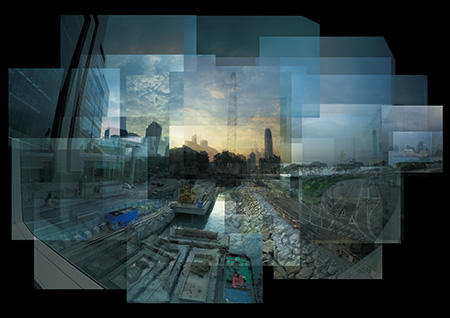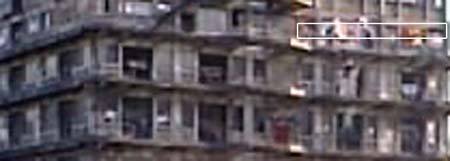by Liao Wen Hui

In recent years, Smartphone becomes more and more popular. Whether we travel on the MTR, take lectures in university, or shuttle in the streets, Smartphone is all rounded. Wherever we go, we can see people holding a Smartphone for playing games, snapping photos or just glancing at Facebook. Manufacturers continue to introduce a variety of applications to users. And the program for modifying photos is one of most prevalent applications.
People can modify photos in any places in anytime with those editing tools. Not only it can edit photos after shooting them immediately, but also it is easier than such software like Photoshop to use. It may be much user-friendly for people to add post effects to pictures. On the other hand, these applications may lead to aesthetic disaster for photography. Because of the established effects and automatic processing functions, people seldom give careful consideration, testing or practice. People only need to slightly adjust the color and brightness level if they want. They tend to rely on these applications when those come to easy obtain post-produced photos.
This artwork makes an irony to the phenomenon of overusing editing applications.
(Lire la suite…)
by Mak Chau Ha

Surrounding by hundreds of tall buildings and skyscraper, and living with 7,000,000 of people, I sometime strongly feel a sense of lost when I travel arround my hometown, Hong Kong. For Cantonese living in Hong Kong, we eat similiar kinds of food; breath from the same atmosphere; have similar cultures and backgrounds, I still cannot feel we are in a unit. There is dissociation. In another words, I feel I am trapped in a MAZE.
To figure out what is going on, I started to do observation in streets and roads by taking photos. I totally took hundreds of photos; the images are so familiar but with a separation which cannot be put into words. I discovered that I am not as ‘understand’ Hong Kong as I imagined. I try to organize my flashback by choosing photos and do collage works.
Th image above is one of the work created by using photos I took in HKCEC. As I feel I am small and being trapped, I decide to arrange the photos in fish eye view. The window frames and the dark center also form an eye-like image which give more meaning to this work. Besides, I purposely keep the blurs of objects that are outside the window. The paths are unclear and the buildings are like mirages. They represent my uncertainty and confuse towards my hometown. The dizzy feeling created is just like getting lost in city.

J’ai toujours cherché à trouver du positif dans les limites. Adolescent, la myopie m’apparaissait comme un excellent moteur de créativité. Elle est encore –plus que jamais- pour moi un handicap béni comparable en cela aux limites d’une mémoire déficiente. Bien voir le présent dans tous ses détails me semble du même ordre que conserver la mémoire intacte d’un fait passé. J’ai appris à reconstruire le souvenir comme à inventer le présent qui m’échappait optiquement. J’associais à ce processus de reconstruction la question du champ de vision, la myopie facilitant une perception syncrétique du monde et, partant, une perception plus globale des phénomènes observés. Je n’ai jamais pu vérifier cette intuition mais j’ai le sentiment de l’avoir vécue en continu. Un peu comme si la profondeur de champ optique était compensée par une largeur de vue. Comme si le manque de profondeur de champ mnémonique était compensé par la recherche de tendances identifiables qui permettraient de déduire d’une perception lacunaire l’information manquante; N’est-ce pas là l’équivalent des solutions techniques employées dans la correction d’erreurs pour les données numériques ?
Inter- et extra-polation.
Perception et mémorisation compensées par projection et prospection.

Dans le flou de vision, ce n’est pas une réduction d’information qui s’opère mais l’émergence d’informations de substitution, une vision palliative. Le chaotique à l’extrême. Alors que la structure cartésienne du construit semble céder sous la pressions et les tensions conjuguées de la pesanteur et de la digestion sociale, l’organique reprend le dessus. Pour la vision déficiente, isoler le détail, ce n’est pas mieux voir ce qui échappe mais, du fait de dissolution des formes qui résulte de l’agrandissement ; mieux percevoir ce que l’acuité perceptive aurait pu masquer par excès de détail. L’entropie sociale serait un retour de l’organique, de la matière organisée pour nier la règle, l’angle droit, l’homogénéité. La culture redevient vivante en laissant l’homme procéder à son propre effacement.
Le projet :
Traquer les modèles récurrents, en deçà des seuils de la perception, par delà la physique, juste après, d’un juste retour des forces comme si les limites de nos perceptions donnaient à voir le devenir des choses.
Ne prétend-on pas percevoir le lointain passé de l’univers en regardant plus loin le ciel ?
Des indices, des preuves, des fragments juxtaposés qui donneraient à lire l’histoire à venir du sensible.

A panorama is a 360° vision around the viewer point. This assumes that the global view around brings more meaning that the 60° view of an ordinary photo camera.
At the opposite, the framing of the plain 60° photo camera is also a cut out in reality, assembling elements on the same surface, excluding elements out of frame.
What is the peculiar truth of this exclusion?
Why not decide, whatever I want to shoot, to frame 45° left instead of the original picture I planed to do?




